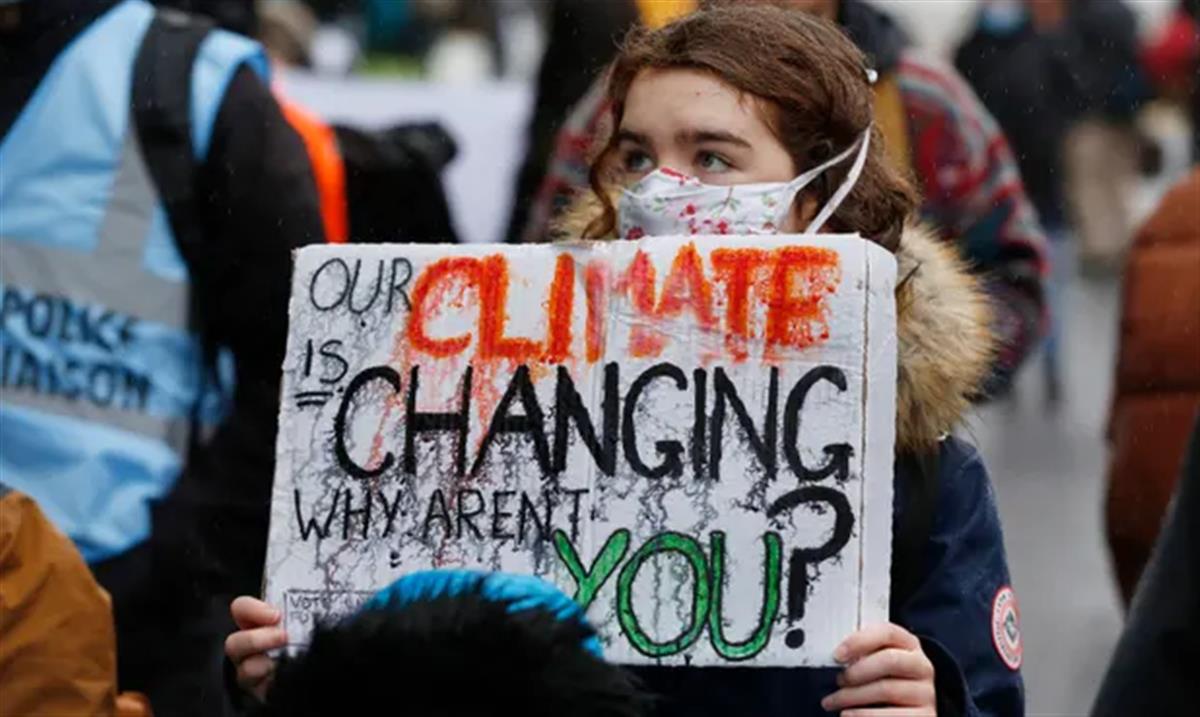
‘Our enormous financial resources mean the world can now finance the transition to net zero.’ Photograph: Murdo MacLeod/The Guardian
Last modified on Sat 13 Nov 2021 10.08 GMT
If global finance can step up to the net-zero challenge, governments surely can
Mark Carney
A new alliance of financial institutions is committed to funding the changes necessary to avert climate catastrophe
Six years ago, in Paris, countries reached an historic agreement to limit the global temperature rise to less than 2C, targeting 1.5C. In finance, we launched the task force on climate-related financial disclosures so that companies would disclose their climate-related risks, allowing finance to measure what matters.
Despite these breakthroughs, in the years that followed, action didn’t match ambition. Few countries pursued the necessary policies, and business investment in decarbonisation was limited. Too many in finance thought that the climate crisis was someone else’s problem.
People will no longer tolerate worthy statements followed by futile gestures. They won’t settle for governments making announcements at Cop summits that they don’t meet at home. Or for companies that speak green but don’t act. That’s why, on the road to Glasgow, we’ve worked to transform the heart of finance.
In April, we launched the Glasgow Financial Alliance for Net Zero (GFANZ), which now covers the entire waterfront of finance: banks, insurers, pension funds, export credit agencies and asset managers. It comprises more than 450 leading financial institutions from 45 countries. Its members have committed to managing their assets, which total more than $130tn, in line with achieving 1.5C. The total cost of the global transition is estimated to be about $4tn every year for the next three decades, so there are now more than enough readily available resources to do the job.
New loans and investments from GFANZ members will not only fund green projects such as renewable power, but will also go where the emissions are – in sectors such as autos, steel, cement – and back those companies with plans to decarbonise, while withdrawing capital from those companies that aren’t moving fast enough.
While this is a watershed achievement, some are understandably sceptical. After all, if governments didn’t follow through after Paris, why would finance after Glasgow? There are several ways we can ensure that, for private finance, the road from Glasgow will be paved with credible actions, not just good intentions.
First, GFANZ is focused on near-term results. Our members haven’t just committed to net zero financed emissions by 2050 at the latest. They’ve also agreed to target their fair share of the 50% greenhouse gas emissions reductions by 2030 that are needed to keep the world on track for 1.5C. And within 18 months of joining, banks must also set out detailed sector-specific emissions reduction plans.
You can’t greenwash emissions. They’re hard numbers that either go up or down. That’s why every member will also report their progress annually, allowing all stakeholders to judge who is moving fast enough and to challenge those who are not.
Second, our members are required to use the most rigorous science-based transition scenarios, such as the most robust 1.5C pathways from the Intergovernmental Panel on Climate Change and the International Energy Agency.
Third, the group is already working with stakeholders to translate these science-based pathways into real-world transition plans for both its members and the companies they finance. In this, guidance will be given by an expert advisory panel of independent NGOs and academics, the United Nations Framework Convention on Climate Change’s Race to Zero campaign, and the UN secretary general’s new group of experts on net zero standards announced at Cop26. GFANZ will also have an ongoing reporting relationship with the G20’s financial stability board.
We welcome action to regulate these transition plans, and we’re calling on countries to follow the UK’s lead at Cop26.
There are limits, though, even to this rigorous approach. Members will support the initiatives of people, businesses and governments to build a sustainable world, but a financial sector relentlessly focused on the transition cannot drive down emissions by itself.
Governments, in particular, must now step up with ambitious, credible and predictable policies that match their own net-zero pledges. And consistent with the GFANZ call to action, which makes a series of asks of G20 governments to help build a net-zero economy and meet the goals of the Paris agreement, governments must phase out unabated coal and oil power plants by 2030 in developed economies and by 2040 in the developing world. We’re also calling on governments to remove fossil fuel subsidies and adhere to the imperatives of a just transition.
Our enormous financial resources mean the world can now finance the transition to net zero including through new “country platforms”, which will deliver a blend of public and private finance to locally driven initiatives in emerging markets and developing countries. We are working to identify, scale and invest in catalytic initiatives to do just that.
We must use the momentum of Cop26 to drive near-term delivery on the various commitments made. But the world can do more. Given GFANZ’s resources, companies and countries can now raise their ambitions further. After the delays and detours on the road from Paris, we must be sure to travel fast and far on the road from Glasgow.
SOURCE: THE GUARDIAN